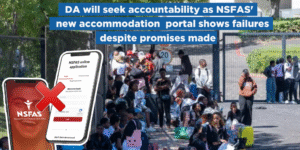We welcome the innovative and continued hard work by the City of Cape Town to create inclusive and affordable housing opportunities which support the dignity of all residents. Since 2012, this has led to more than 60 000 housing opportunities and 17 000 title deeds handed over to residents. This level of delivery is possible because of effective governance, as demonstrated by the City spending its budget, with the City’s Human Settlements Directorate spending 98% of its funding in the 2019/2020 financial year, and 95% of its Urban Settlement Grant and 99% of its Informal Settlements Upgrading Partnership Grant for the 2020/21 financial year.
MPP Matlhodi Maseko says: “In the last year, the City has seen the realisation of years of hard work including its new Human Settlements Strategy, the release of draft spatial development frameworks for District 6 and the Bo-Kaap, as well as the City’s new maintenance and repair initiative. The City’s Human Settlements Strategy, which took two years to draft, guides the City in achieving its goals of bringing communities together. The Strategy aims to partner with the private sector and the City in creating affordable and inclusive housing, cut red tape to fast track housing developments, and leverage its work to economically support micro, small and medium developer in the City of Cape Town.
The spatial development frameworks for both District 6 and the Bo-Kaap by the City has partnered with these communities to create safe, vibrant and dynamic spaces which make the City a place for all residents. They work to preserve the historical significance and unique heritage of these neighbourhoods while ensuring developments in these areas can be conducted in a sustainable manner. The City has also allocated R150 million for its new maintenance and repair initiative which uses small and medium contractors to ensure that its rental stock and other housing opportunities are safe and well cared for. In the last 2 years, the City has spent R1 billion in upgrading and maintaining its housing opportunities.
And while the City of Cape Town is working hard to ensure the dignity and safety of residents, elderly residents of the Fever-Tree Complex in the City of Johannesburg have handed over a memorandum to the City’s Housing Department complaining about that their RDP flats have become health hazards as they are living in unsafe conditions. Complainants, most of them over 70 years old, questioned the quality of the work of the as residents were living with water leaks, exposed electric cables and broken plumbing for the last three years.
Worse still, in May this year, the Auditor General’s office revealed that in eThekwini, nearly 1000 housing opportunities were inhabitable as inspectors had found several structural defaults with the R105 million project continually plagued with missed deadlines. In fact, terrain across from the block of housing units had collapsed against these new houses and blocked off access to them. The Auditor General’s office stated that a slow response to implementing the project and a lack of consequences may be the root cause of the problems that effected this project.
Creating housing opportunities remains one of the most capital and time intensive services government provides. However, this is a human right and constitutional imperative which every government must progressively aim to achieve.”




